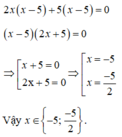Tìm x biết |X-1|=2xX-3

Những câu hỏi liên quan
tìm x biết 2xX+108 chia hết cho 2xX+3
Tìm x biết
3/2xX+X=90
Tìm x,y biết: 2xx+yy=136 và x/y=3/4
gọi k là hệ số ty lệ
ta có x/3 = y/4 = k
18k2+16k2 = 136 => 34k2 = 136 => k2 =4 =>k=2
x = 2.3 = 6
y = 2.4 = 8
Đúng 0
Bình luận (0)
Tìm x,y thuộc Z biết x^2-2xx=27y^3
Tìm tất cả các cặp số tự nhiên (x,y) khác 0 biết
(2xx+5)x(x+2)=3y
Tìm x, biết: 2 x x – 5 + 5 x – 5 = 0
Tìm X:
a,2xX-5=21
b,3/4+1/4xX=5/6
c,7/8-1/2xX=5/6
d(1/1x2+1/2x3+1/3x4)x100-[5/2:(X+206/100)]:1/2=89
\(a)\) \(2x-5=21\)
\(\Leftrightarrow\) \(2x=21+5\)
\(\Leftrightarrow\) \(2x=26\)
\(\Leftrightarrow\) \(x=26:2\)
\(\Leftrightarrow\) \(=13\)
Đúng 0
Bình luận (0)
\(b)\) \(\frac{3}{4}+\frac{1}{4}x=\frac{5}{6}\)
\(\Leftrightarrow\) \(\frac{1}{4}x=\frac{5}{6}-\frac{3}{4}\)
\(\Leftrightarrow\) \(\frac{1}{4}x=\frac{1}{12}\)
\(\Leftrightarrow\) \(x=\frac{1}{3}\)
Đúng 0
Bình luận (0)
\(c)\) \(\frac{7}{8}-\frac{1}{2}x=\frac{5}{6}\)
\(\Leftrightarrow\) \(\frac{1}{2}x=\frac{7}{8}-\frac{5}{6}\)
\(\Leftrightarrow\) \(\frac{1}{2}x=\frac{1}{24}\)
\(\Leftrightarrow\) \(x=\frac{1}{12}\)
Đúng 0
Bình luận (0)
Xem thêm câu trả lời
Tìm x thuộc N để
a, X+3 chia hết cho X-1
b, 4x X+3 chia hết cho 2xX-1
x+3 chia hết cho x-1
x-1 chia hết cho x-1
=> x+3 - (x-1)=4 chia hết cho x-1
\(x-1\in\left\{1;-1;2;-2;4;-4\right\}\text{ }\)
=>\(x\in\left\{2;0;3;-1;5;-3\right\}\text{ }\)
b) 2x -1 chia hết cho 2x-1
=> 2(2x-1)=4x-2 chia hết cho 2x-1
=> 4x+3 - (4x-2)=5 chia hết cho 2x-1
\(2x-1\in\left\{1;-1;5;-5\right\}\text{ }\)
=> \(x\in\text{ }\left\{1;0;3;-2\right\}\)
Đúng 0
Bình luận (0)
a) x+3=(x-1)+4 vì x-1 đã chia hết cho x-1 rồi => x+3 chia hết cho x-1 <=> 4 chia hết cho x-1 <=> x-1 thuộc Ư(4) <=> x-1 thuộc (1;2;4) => x thuộc (2;3;5)
b) 4x(x-3) =4x(x-1-2)=4x(x-1)-4x.(-2)=4x(x-1)+4x.2
vì...( như trên) =>x-1 phải thuộc Ư(2 <=> x-1 thuộc (1;2) <=> x thuộc(2;3)
Đúng 0
Bình luận (0)
a)1/2xX+3/2=7
b)3/2xX-2/7x(X-7/2)=18
`1/2 xx x +3/2 =7`
`=> 1/2 xx x = 7-3/2`
`=> 1/2 xx x = 14/2 -3/2`
`=> 1/2 xx x = 11/2`
`=> x= 11/2 :1/2`
`=> x=11/2 xx2`
`=> x= 22/2`
`=>x=11`
Vậy `x=11`
__
`3/2 xx x -2/7 xx(x-7/2)=18`
`=> 3/2 xx x -2/7x + 1=18`
`=> (3/2 -2/7 )x+ 1 =18`
`=> 17/14 x=18-1`
`=> 17/14x=17`
`=>x=17:17/14`
`=> x=17 xx 14/17`
`=>x=14`
Đúng 4
Bình luận (0)
a) \(\dfrac{1}{2}\times x+\dfrac{3}{2}=7\)
\(\dfrac{1}{2}\times x=7-\dfrac{3}{2}\)
\(\dfrac{1}{2}\times x=\dfrac{11}{2}\)
\(x=\dfrac{11}{2}\div\dfrac{1}{2}\\ x=\dfrac{11}{2}\times2\\ x=\dfrac{22}{2}=11\)
b) \(\dfrac{3}{2}\times x-\dfrac{2}{7}\times\left(x-\dfrac{7}{2}\right)=18\)
\(\dfrac{3}{2}\times x-\left(\dfrac{2}{7}x-1\right)=18\)
\(\dfrac{3}{2}\times x-\dfrac{2}{7}x+1=18\)
\(\dfrac{3}{2}x-\dfrac{2}{7}x+1=18\)
\(\dfrac{17}{14}x+1=18\)
\(\dfrac{17}{14}x=18-1\)
\(\dfrac{17}{14}x=17\)
\(x=17\div\dfrac{17}{14}\)
\(x=17\times\dfrac{14}{17}\)
\(x=14\)
Đúng 0
Bình luận (0)
a) \(\dfrac{1}{2}\times x+\dfrac{3}{2}=7\)
\(\Leftrightarrow\dfrac{1}{2}\times x=7-\dfrac{3}{2}\)
\(\Leftrightarrow\dfrac{1}{2}\times x=\dfrac{11}{2}\)
\(\Leftrightarrow x=\dfrac{11}{2}:\dfrac{1}{2}\)
\(\Leftrightarrow x=\dfrac{11}{2}\times\dfrac{2}{1}\)
\(\Rightarrow x=11\)
b) \(\dfrac{3}{2}\times x-\dfrac{2}{7}\times\left(x-\dfrac{7}{2}\right)=18\)
\(\Leftrightarrow\dfrac{3}{2}\times x-\dfrac{7}{2}\times x+1=18\)
\(\Leftrightarrow\left(\dfrac{3}{2}-\dfrac{7}{2}\right)\times x+1=18\)
\(\Leftrightarrow\dfrac{17}{14}\times x=18-1\)
\(\Leftrightarrow\dfrac{17}{14}\times x=17\)
\(\Leftrightarrow x=17:\dfrac{17}{14}\)
\(\Leftrightarrow x=17\times\dfrac{14}{17}\)
\(\Rightarrow x=14\)
Đúng 0
Bình luận (0)






















